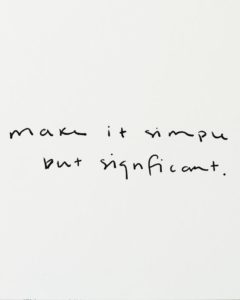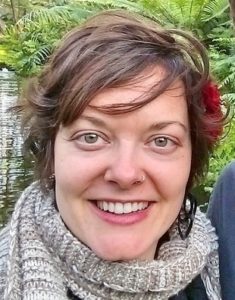Katie’s Story
As I was crossing the Fox River on the Highland Avenue bridge on a misty Sunday morning in Elgin, IL, a Bald Eagle stretched its wings and soared directly over top of me. I don’t know if I would have caught it if I had been driving my little Mazda across town to preach at the Highland Avenue Church of the Brethren, where I am the pastor, but since I was on my bicycle, there was no glass or steel to block my vision of this serene creature’s stark white head and strong brown body gliding discretely through the grey winter morning.
 From December through April, my family has pedaled more miles than we have driven. It has been a mild winter in northern Illinois, but even on below freezing days, my family, including my well-bundled 2-year-old and 4-year-old, have more often than not chosen our bikes over our car to get to church on Sunday mornings.
From December through April, my family has pedaled more miles than we have driven. It has been a mild winter in northern Illinois, but even on below freezing days, my family, including my well-bundled 2-year-old and 4-year-old, have more often than not chosen our bikes over our car to get to church on Sunday mornings.
Since selling our second car in September and purchasing a long-tailed cargo bike for hauling both groceries and precious toddler cargo, my family has grown increasingly fond of this means of transportation as well as increasingly fond of the city in which we live. We have found it much easier to have occasion to greet our neighbors or strike up conversations at the bike corral with perfect strangers. Traveling at 5-10 miles per hour instead of 30 miles per hour through my city’s streets allows me to stop and chat with a congregant at work in his front yard, rather than throwing a quick wave while I blow by. The novelty of the long-tailed bike has more than once been the reason for a motorist stopped with us at a traffic light to roll down the window and start a curious and friendly conversation. Once while locking up outside a local supermarket the children made friends with a local store clerk and returned to find the cargo bike sporting a new, bobbing, bright yellow, helium-filled balloon. In the fall we enjoyed the view of the Autumn leaves. This winter we have been even more grateful for our warm house after frosty bike rides. And, as the spring erupts in Elgin, we have welcomed the miles of tulips, daffodils, and magnolia blossoms right alongside the bloom of increased bike and pedestrian traffic in these friendlier temperatures. All these encounters help me to feel more connected to the physical world and community around me than I feel in my car.
Not all bicycle-fueled encounters are as pleasant as spotting a high-sailing eagle or turning a stranger into a friend. When traveling alone on my bicycle, I have been the target of gender-based street harassment and have received other vulgarities hurled high-speed at me from car windows. Those are encounters my husband and children have never experienced and ones I never have in my car. When biking to work I also notice the incomplete infrastructure and the lack of sidewalk clearing after snows that makes it more dangerous for folks to bike and walk in my city. And I notice the people who are walking or biking like me. I see men who appear to have all their belongings on their backs. I see women walking with their coats zipped high and their ear pods implanted. I have seen mothers struggling across icy sidewalks with strollers. I wonder how many of them are out in all weather like me by choice and how many of them simply have no other choice to get to home, work, school, or food.
The congregation I serve, like many other congregations, is seeking to renew and re-envision its call to community engagement in a world and a city that has changed quickly around it. The church’s three-year strategic plan asks, “What does it mean for the Highland Avenue Church of the Brethren to be a vital presence in the Elgin community? How does our identity affect the way we relate to the community, and how does the Elgin community shape us? Where do we lead? Where do we follow?”
The Israelites are in a time of renewal after many have returned from exile in Babylon when they hear the words of Isaiah 58. In this text, God speaks to the people and lets them know that the religious checklist of pious acts they have been crossing out has lost its power to transform them and transform their community. The voice of God tells them they only fast to serve their own interests and in doing so, oppress their workers (Isaiah 58:4). Rather God asks,
Is not this the fast that I choose:
to loose the bonds of injustice,
to undo the thongs of the yoke,
to let the oppressed go free,
and to break every yoke?
Is it not to share your bread with the hungry,
and bring the homeless poor into your house;
when you see the naked, to cover them,
and not to hide yourself from your own kin?
Riding my bike is a simple act and not one I think of every day as transformative, but it has changed the way I relate to the environment around me. Moreover, the more I read about bicycles as transit, the more hopeful I become that this mode of transportation can address aspects of racial inequality, economic inequality, epidemic loneliness and isolation, and environmental sustainability. In Isaiah, God tells the people, if you choose this kind of fast, then you will be called “repairers of the breach” and “restorers of streets to live in.” My prayer is that my family’s commitment to two-wheeled transportation will help us to answer that call to repair the breach and restore the streets of our city one pedal stroke at a time.
Anna Lisa’s Story
I like to tell people I bike everywhere because I’m lazy. I don’t carry quarters for parking meters, and I still get the best parking spots. But biking is only easy with preparation. Luckily, Brethren know about disciplines, spiritual and otherwise, and have the skills needed to bike simply.
I don’t mean to conflate lazy, easy, and simple. Lazy was just to get your attention and even make you smile! As we know, living simply can be easy, but it’s often quite complicated.
 That’s where habits come in. If your spiritual disciplines include daily scripture study, you probably have a certain chair where you read and even a favorite Bible. That Bible might stay on the end table by that chair, and maybe there’s a coaster for your morning cup of coffee.
That’s where habits come in. If your spiritual disciplines include daily scripture study, you probably have a certain chair where you read and even a favorite Bible. That Bible might stay on the end table by that chair, and maybe there’s a coaster for your morning cup of coffee.
Biking everywhere can be that easy if you have as much habit and preparation. You’ll never make a practice of biking if you start the decision-making from scratch each morning, and have to decide on the spot what to wear, find a helmet, pump up your tires, and plan your route.
If you don’t know where to find a Bible and haven’t chosen a time of day to read scripture, you won’t pull off that spiritual discipline.
I have old track pants that I can pull over thick leggings – even a dress. I have a thin plastic coat and a thick plastic coat. I keep nice clothes at my office. I can bike in any weather (except ice) and for any occasion by building in these routines.
Because I bike every day, charging my headlights and pumping my tires is nearly automatic, and I do it at the end of the day (I’m not a morning person, so telling myself I’ll get up earlier to maintain my bike sets me up for failure).
Not always easy, but simple, because I’m not thinking through each choice every time. Habits are a gift.
Moving to the Pennsylvania mountains threatened my simple living cycling practice. I could no longer take my morning coffee in my bike’s cup holder without ½ of it spilling on my way down our steep, long driveway. It wasn’t easy to lose the pleasure of sipping coffee on my morning commute because I kept trying to complicate things – finding a better travel mug or holding it my hand down the driveway (which gave me some serious road rash one day). When I gave up that commute coffee habit, I simplified my morning routine.
Our individualistic culture has a shallow notion of freedom – that freedom means we get to make any choice we want. Not only is this toxic and impractical, but we also end up with even less freedom. Freedom is not 127 deodorant choices at a grocery store. Freedom is not trading the climate-controlled box of our homes, where we can pick the voices we listen to and restrict who comes inside, for the climate-controlled box of our cars, where we can pick the voices we listen to and restrict who comes inside.
As Paul wrote to the Galatian church,
It is absolutely clear that God has called you to a free life. Just make sure that you don’t use this freedom as an excuse to do whatever you want to do and destroy your freedom. Rather, use your freedom to serve one another in love; that’s how freedom grows. For everything we know about God’s Word is summed up in a single sentence: Love others as you love yourself. That’s an act of true freedom. (MSG)
It’s so much easier for me to love people when I’m biking than driving – driving makes it so easy to ignore humanity and instead see vehicles – too fast, too slow, bumper stickers I like or don’t like. On my bike I look people in the eye: drivers – to make sure they see me, pedestrians and other cyclists – to exchange a greeting. I think I’m easier to love when I’m on my bike, too! Occasionally I’m harassed by drivers, but often I get a smile and wave, for my bright orange milk crate (cyclist version of a trunk) or the surprising combo of plastic track pants with cute shoes.
 Katie Shaw Thompson is the pastor of the Highland Avenue Church of the Brethren, the mother of two young children, and a four-season bike commuter in Elgin, IL.
Katie Shaw Thompson is the pastor of the Highland Avenue Church of the Brethren, the mother of two young children, and a four-season bike commuter in Elgin, IL.
 Anna Lisa Gross is the interim pastor of the Stone Church of the Brethren. She is grateful to be involved in planning worship and rituals, creative writing, joining people in the joys and sorrows of their lives, asking provocative questions, tending to beginnings and endings, community organizing, and advocating for justice.
Anna Lisa Gross is the interim pastor of the Stone Church of the Brethren. She is grateful to be involved in planning worship and rituals, creative writing, joining people in the joys and sorrows of their lives, asking provocative questions, tending to beginnings and endings, community organizing, and advocating for justice.
Image Credits: Momentum Mag & UK Pintrest

